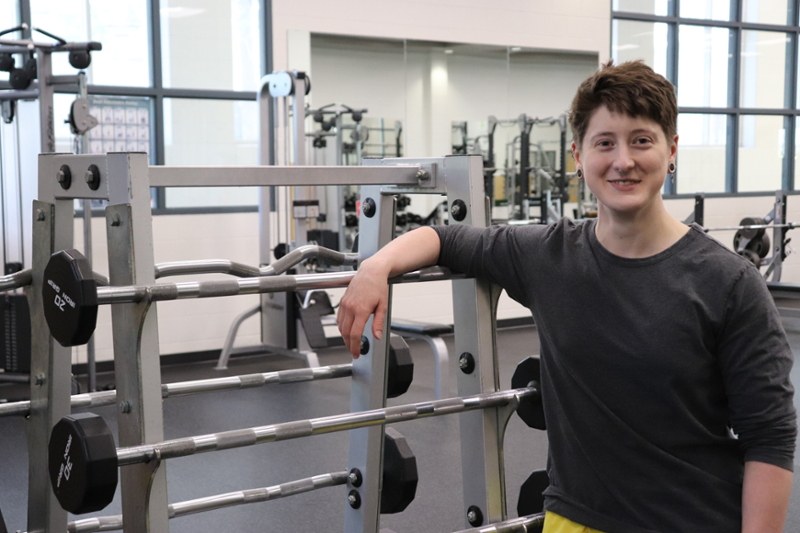
Kinesiology graduate, faculty and staff awarded RCE-SK Education for Sustainable Development Recognition Award.
Recent graduate, Kit Stern (BSKI’25) and mentors earned the recognition through her practicum project called GOLDEN.
By Alyssa WiebeRCE- SK is a United Nations University-designated Regional Centre of Expertise (RCE) on Education for Sustainable Development. The awards recognize education initiatives that take action toward the UN Sustainability Goals and create impact within community.
The GOLDEN program promoted healthy aging in an often-underserved demographic and represents a model of experiential learning in action—providing quality education through hands-on planning, delivery, and evaluation by students.
Over the past academic year, Stern – under the guidance of mentors Jason Weber (HPC Coordinator – Usask Rec), Shannon Forrester, and Bart Arnold (both faculty members in the College of Kinesiology) —designed and implemented a free-weight resistance training program tailored specifically for older adults in Saskatoon.
“I started thinking about this project while working in Dr. Chilibeck’s lab with older adults on the FORTIFY bones study. As participants were finishing up, they were asking how they could continue resistance training,” said Stern.
“They had found participating increased their ease of completing daily tasks and improved their confidence in movement. I found few resources focused specifically towards older adults and resistance training which prompted my desire to try and produce a program with USask Rec. The pilot program has been completed as a proof of concept. Jason and I are working to produce a regular program that can be attended by our USask community.”
Supported in both scientific research and community input, the project aimed to create accessible, safe, and effective fitness options for aging populations. Her initiative followed a full program planning cycle, culminating in a pilot phase that included 14 participants across two sessions: a four-week and an eight-week program.
The training sessions were designed with two distinct focus areas: one for individuals with no prior experience in free weight resistance training, and another for those with previous experience. The pilot intended to explore how customized fitness programming could support strength, health, and overall wellness among older adults.
“We recruited participants through word of mouth and via outreach to various older adult networks,” said Shannon Forrester, a faculty member in the College of Kinesiology. “Each participant was recognized through active collaboration fostering a positive and productive learning environment. In each class, Kit received feedback and incorporated that feedback into future sessions.”
Forrester added that the project yielded many unexpected insights.
“Firstly, scheduling proved to be particularly challenging. Contrary to our initial assumption that many potential participants would be retired, this was not necessarily the case. Interestingly, all our participants were women, which is notable given the demographic's potential influence by social constructs around physical activity, especially weight training. Additionally, all participants were of Caucasian ancestry, highlighting the need for greater outreach and consideration to ensure demographic diversity in future programming.”
This programming is significant because resistance training reduces the risk of falls, fractures, and age-related chronic diseases—key factors linked to premature death. By promoting longevity and reducing preventable health issues, it supports Canada's goal of lowering premature mortality.
Integrating free weight resistance training into the daily lives of older adults not only enhances their personal health but also advances national public health objectives. It aligns with Canada’s commitment to Sustainable Development Goal 3: ensuring health and well-being for all at all ages.
Resistance training helps older adults preserve muscle mass, strength, and physical function—critical components of healthy aging. It also supports mental well-being, lowers the risk of chronic conditions such as diabetes, and improves cognitive function.
The success and solid foundation of the GOLDEN initiative provides momentum for ongoing growth and broader impact. As a pilot program, it seeks to expand its reach through future offerings by USask Rec, enabling more older adults to access these valuable services.
“I know it’s been said before, but our college really does have excellent practicums that can provide creative education opportunities. It means a lot to me that a space exists that I could try my program with the support of other professionals,” said Stern.
Furthermore, older adult programming through USask Rec presents potential opportunities for student employment or volunteer involvement—particularly for students in courses like KIN 424 (Physical Activity and Aging) and HPC USask Rec staff. These opportunities offer students meaningful, hands-on experience working with older adults, enriching their education while advancing the College of Kinesiology’s mission to promote active and healthy lifestyles.
“I know that gym/fitness facility settings can be intimidating to those starting out with resistance training no matter the age. I want to emphasize to our community that USask Rec aims to be welcoming no matter your experience level, movement background or age,” said Stern.

